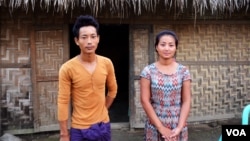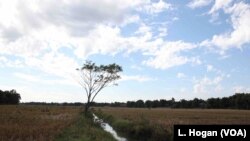A new land conflict is threatening to erupt in Myanmar, where land is so sought after that even a cemetery can be eyed by developers.
To protect her village's graveyard, 57-year-old Bawm Lawm began a sit-in protest.
"Together about 80 women came out of their homes," she said. "But we were already too late … business people were digging in the graves and we could see some dead bodies exposed."
In Man Wein village, Waingmaw township, in Myanmar's northern Kachin State, a banana plantation has been swallowing whole villages.
The women of Man Wein refused to give in when excavators arrived overnight. Arms linked they organized a sit-in protest at the cemetery. Then, armed with megaphones, they sat in front of the town administrator's home. After four days, a militia leader on behalf of the plantation owners met with the protesters and agreed on a boundary of 20 acres -- less than half of the original cemetery land.
Bawm Lawm thought that would be the last battle she'd have to fight to protect her community's native land.
But a new law has people on edge once again.
Trespassers on their own land
In September an amendment to the Vacant, Fallow and Virgin (VFV) Lands Management Law was passed, that requires all people on VFV land to apply for a permit. If they fail to do so, they could be arrested for trespassing on their own land and face up to two years in prison.
"This law change can spark more and more conflict over land," warned Kachin State Farmers Association representative Tang Gun. "The land issue is already very complicated in Myanmar, farmers are still waiting for court to decide whether their land should be returned by the military and these land cases are never resolved within a year."
People have less than three months to apply for a permit, with the deadline of March 2019.
Nearly one-third of Myanmar's land is considered by the government to be vacant, fallow or virgin land, amounting to over 45 million acres. Seventy-five percent of that land is found in ethnic states. And many of these states have thousands of people displaced by conflicts that can't return home to apply for a permit.
Many rural farmers VOA interviewed said they didn't even know this amendment had been passed. Farming networks worry that this information also won't reach most communities in the isolated areas.
Tang Gun points out it is almost impossible to see whether the government recognizes one's land as VFV land as there are no publicly available records.
The Myanmar Department of Agriculture, which oversees land management issues, did not respond to numerous requests for comment.
Union Minister for Agriculture, Livestock and Irrigation, Aung Thu, told the Myanmar Times earlier this year that the VFV law would be revised to streamline the land-related laws and confirmed "it is crucial that a peaceful approach is taken."
Indigenous groups say customary land is not up for grabs
International and Myanmar-based NGOs have sent an open letter to the VFV Land Management Central Committee with 41 signatures calling for the law to be halted to "prevent further imprisonment and eviction of innocent individuals." Chief among these concerns for Kachin communities is to halt the allocation of VFV lands to private entities such as Chinese backed banana plantations.
Others want this law to be totally abolished.
"This law's definition of vacant' land is insulting because the government is ignoring that many ethnicities and different cultures use land differently," said Ye Lin Myint, country coordinator of Myanmar Alliance for Transparency and Accountability (MATA), who was part of another joint letter sent on behalf of the network Land in our Hands'.
Myanmar is home to 134 ethnic minorities. For many, their traditional use of the land ranges from hunting and foraging in forests to farming in the uplands using shifting cultivation. Ethnic communities often collectively manage the land with their own customary laws.
"You can not separate land and man, to take land away from man means you lose your identity," added Ye Lin Myint, with two hands clutched to his heart.
He believes the exception in the amendment of customary land' is vague and does not provide a clear definition or establish any processes through which customary land could be recognized.
Myanmar-based Land Core Group's country director Shwe Thein also directs attention to the question of who will define customary land.
"How customary land is defined could be a key strength of this amendment if the government and ethnic leaders decide together, then it might be seen as a strength, not as a threat," he said.
Wiping the slate clean' for future generation's inheritance of land
Major flaws in the terms of the law are adding fuel to the fire.
One alarming issue is that the permit is only for 30 years.
"They are being forced to choose between giving up customary tenure rights in exchange for the chance to apply for weak, restrictive land user rights on the one hand, or assert their customary rights, but risk dispossession and years in prison on the other," explained Ben Hardman, Deputy Legal Director from Earth Rights International.
The missing element of a dispute mechanism also means opportunists could try and claim land that is not theirs.
"It's like making suicide for us Kachin Karen or Naga brothers and sisters if they decide not to register their land. Yet they also lose if they do register as they only get a 30 years lease," said Ye Lin Myint.
Aung San Suu Kyi's land reform
Under Aung San Suu Kyi's National League of Democracy (NLD) government, one of their election promises was to give back land to the landless farmers.
A new overarching National Land Use Policy to replace some 60 land-related laws, was endorsed by Aung San Suu Kyi when she first took office.
Tim Millar, Myanmar director of the land rights group Namati believes reinvestigation committees into land grabbing cases, have been a step forward in decentralizing power and "increasing community participation in land governance systems and making space for civil society."
Yet many agree that the VFV amendment directly contradicts the National Land Use Policy.
"Implementation of this law in its current form could feasibly result in mass forced evictions throughout rural areas, an outcome strictly prohibited under international law, including the International Covenant on Economic, Social and Cultural Rights ratified by Myanmar only last year." said Sean Bain, legal advisor with International Commission of Jurists.
While the government has stated that this amendment was made in an effort towards the resolution of land disputes, many land rights groups question the motive.
"This amendment is said to have support from high up in government and people are concerned it is an attempt to wipe the slate clean' and free up' more land for investment," said Hardman.
For village head, Bawm Lawm, she's worried that this law stops her from passing her land on to her grandchildren: "What if they are cut off from going to the forests freely or accessing water. Then how will they survive?"





